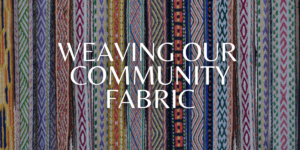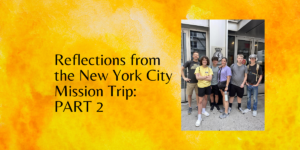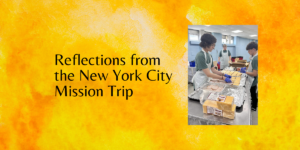Jeremiah 18:1-6 and The Gospel of Matthew 9:35-38; 20:29-34
Third Sunday During Lent, March 12, 2023
Third in a Pastoral Series on The Way of Jesus: Attitudes and Actions
Dennis W. Foust, PhD, Senior Minister
____________________________________________________
God creates compassionate space in your heart so you can work with God to build a better world.
Mazhar Mallouhi was born into a prominent Syrian Muslim family. His family tree traces back to the Prophet Mohammed. From childhood Mallouhi was an avid reader. During adolescence, he developed a spiritual restlessness and studied other Eastern religions. He reached the conclusion that humans created a hell on earth, so they created the idea of God as an escape to obtain peace of mind. He thought people of all religions proclaim something they do not live and strive for something they never experience. He refused to study Christianity because he saw it to be a tool of oppressive colonialists. He knew Christians call Christ the Prince of Peace while waging war. During the 1950s, Mallouhi began writing for newspapers. He also started reading the writings of Mahatma Ghandi. What shocked him was Ghandi’s fascination with Jesus Christ. So, Mallouhi started studying the Gospels of the New Testament. After one year of study, he concluded that Jesus was different from all other religious leaders he had read. Jesus’ life reflected what the way he taught. Mallouhi was eventually drawn by the words of Christ, “Come to me all you who are weary and heavy laden and I will give you rest.” At the age of 24, he was overcome with the compassion in Jesus’ life. He cried out, “Christ, you are my Lord! Give me this new life you promise!” The world came to life for him. Mallouhi became a popular writer of Arabic novels with a spiritual theme in the genre of Tolstoy and Dostoyevsky. He has written seventeen books that are read all over the Middle East. He followed The Way of Jesus and produced Christian scriptures for the Muslim world in a way that gained unprecedented acceptance by political leaders. Mallouhi presented Jesus as a person of the Middle Eastern culture and some of his books were required readings in courses on Comparative Religions. He taught that if people are to see the true nature of Jesus, they must see people following The Way of Jesus. He said, “Islam is my heritage and Christ is my inheritance.”1 It has been said that the only person to influence the Middle East for Christ more than Mallouhi was Jesus himself. Mallouhi reminds us:
God creates a compassionate space in your heart so you can work with God to build a better world.
The Hebrew word for compassion, stems from the word, rechem, meaning “womb.”
Compassion, like a womb, is the space God creates within you so you can carry another person to give them life. We Build a Better World when we create space within ourselves to move beyond bias, judgment, animosity, and self-absorption. Compassion nurtures new life within us and the world. The life of God in you creates space for other people.
Eric read two stories of Jesus being motivated by compassion. In the first story, Jesus sees the needs of multitudes. The English words are, “harassed and helpless.” The Greek words are, “oppressed and thrown to the ground.” Jesus sees people being oppressed – mistreated by systems and prejudices. He is moved with compassion for the multitudes around him who are thrown to the ground by abusive structures and perspectives of animosity.
This shepherd sees how you notice the multitudes in Charlotte today. You see the 3,300 individuals living in homelessness and you are moved with compassion. You see the 375 homeless families and house some of them within these walls. You see the 7,000 babies born into poverty in Mecklenburg County each year and you become involved with Baby Bundles. Forty years ago, you were one of the seven churches in Charlotte that founded Habitat for Humanity. In these months, you are giving to Habitat to continue helping families of the working poor establish home ownership and have the opportunity to build generational wealth. You see the thousands of young people born into neighborhoods with limited opportunities and invest in Right Moves for Youth. You see the thousands of immigrants and refugees entering our city and you initiate an Immigrant and Refugee Ministry Group. You see how people are oppressed and thrown to the ground and you are moved with compassion. You are answers to the prayer of Jesus who asked for laborers of compassion to enter the plentiful harvest of needs.
The second story Eric read tells of the day Jesus did not see a multitude; he heard two voices. Two blind men cried out to Jesus for attention. The crowd told them to stay quiet. Often the voices of individuals in need are squelched by the crowds trying to pretend calm is the goal. Jesus was motivated by compassion and heard individual voices above the shouts of a multitude.
This shepherd hears how you care for individuals. In the past year, I have learned how you cared for the lonely person in your neighborhood; the new student you went to sit within the cafeteria; the neglected and afraid child in the classroom; the abused woman in the office; the person who was overcome with medical bills; the man who had lost his job; the fragile child you coached in basketball until she showed signs of self-esteem; the relative who felt forgotten; the depressed waitress who found that $100 bill wrapped in the $5 tip; the parent you hugged at the hospital after they heard sad news about their child; the teenager you helped with her homework after her father died in an accident; and the caregiving spouse you took to lunch.
You hear individual voices crying out for compassion as you follow The Way of Jesus.
Some of you know the story I’m about to tell you. But it is a story each of you should know. It is the story of a woman who moved to Charlotte in 1953. She made a difference in her family, in this church, and in this city and region. Her name was Dr. Jonnie McLeod. Jonnie was one of the first women to be ordained as a deacon in this church. She once identified her life priorities to be “help the needy, the lonely, empty rich, those who do not know how to use their own talents, change policies or laws, influence people in power for the good of the majority, or simply perhaps elevate us into more God-like humanity.” Fifty-four years ago, in 1969, she founded what she named, ‘Open House,’ which is now called the McLeod Center. It helps people who struggle with substance use disorder and is now serving 3,900 persons every day. Two weeks ago, most of her family gathered at the Open House of a new facility here in the city. One person moved with compassion now serves 3,900 every day. (AA Group)
Yes, I know, we cannot all do what Jonnie accomplished. And I know you are not perfectly compassionate. Nor am I. This is why I remind you this morning of the story read to us by Jack Crymes; the insightful and wise prophetic story of the potter and the clay.
If you have tried making pottery, you understand that clay is not merely inactive in the potter’s hands. As the potter tries to center the clay on the wheel, the clay moves outward from the center against the potter’s hands. The clay can dry out and become brittle rather than malleable. The clay can be too saturated by moisture and not hold its shape. And the clay can become contaminated by picking up external impurities. Any of these influences can cause the clay to become spoiled, needing to be reworked in the hands of The Redemptive Potter.
My fellow imperfect clay vessels: we are in the hands of The Potter, being remade and remade and remade into vessels of compassion. This happens to you as you follow The Way of Jesus.
God creates a compassionate space in your heart so you can work with God to build a better world.
Amen and AMEN!









